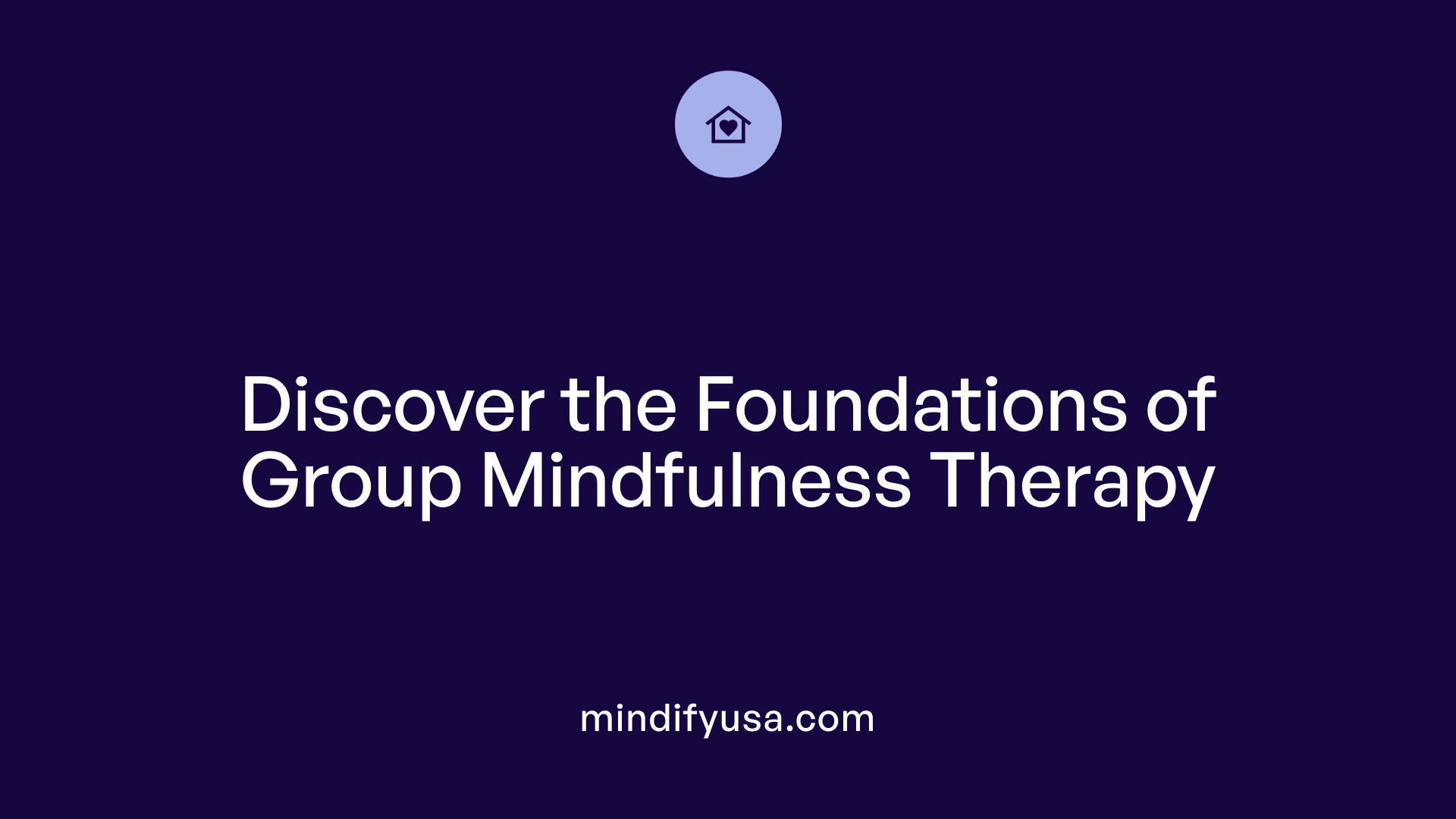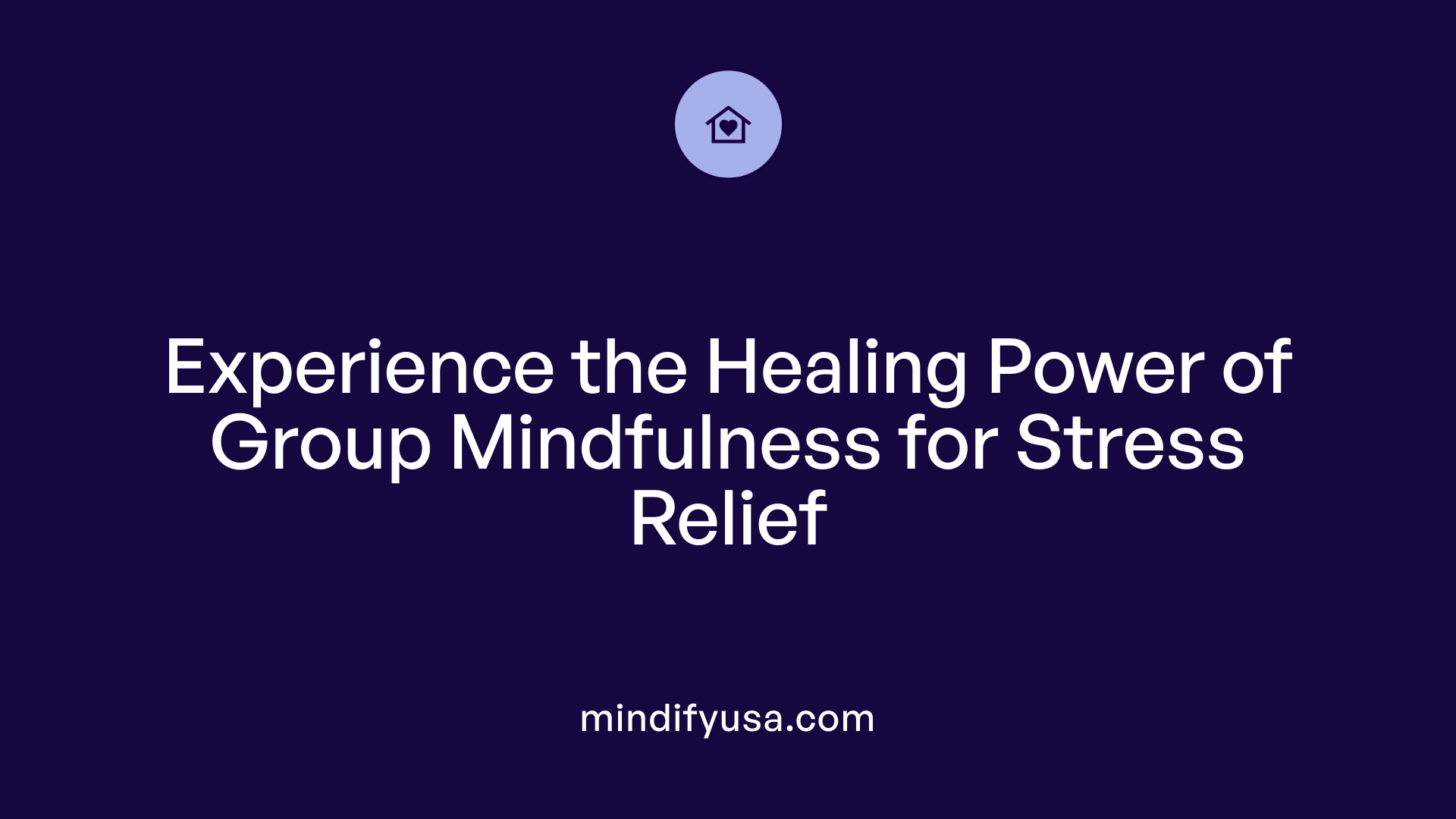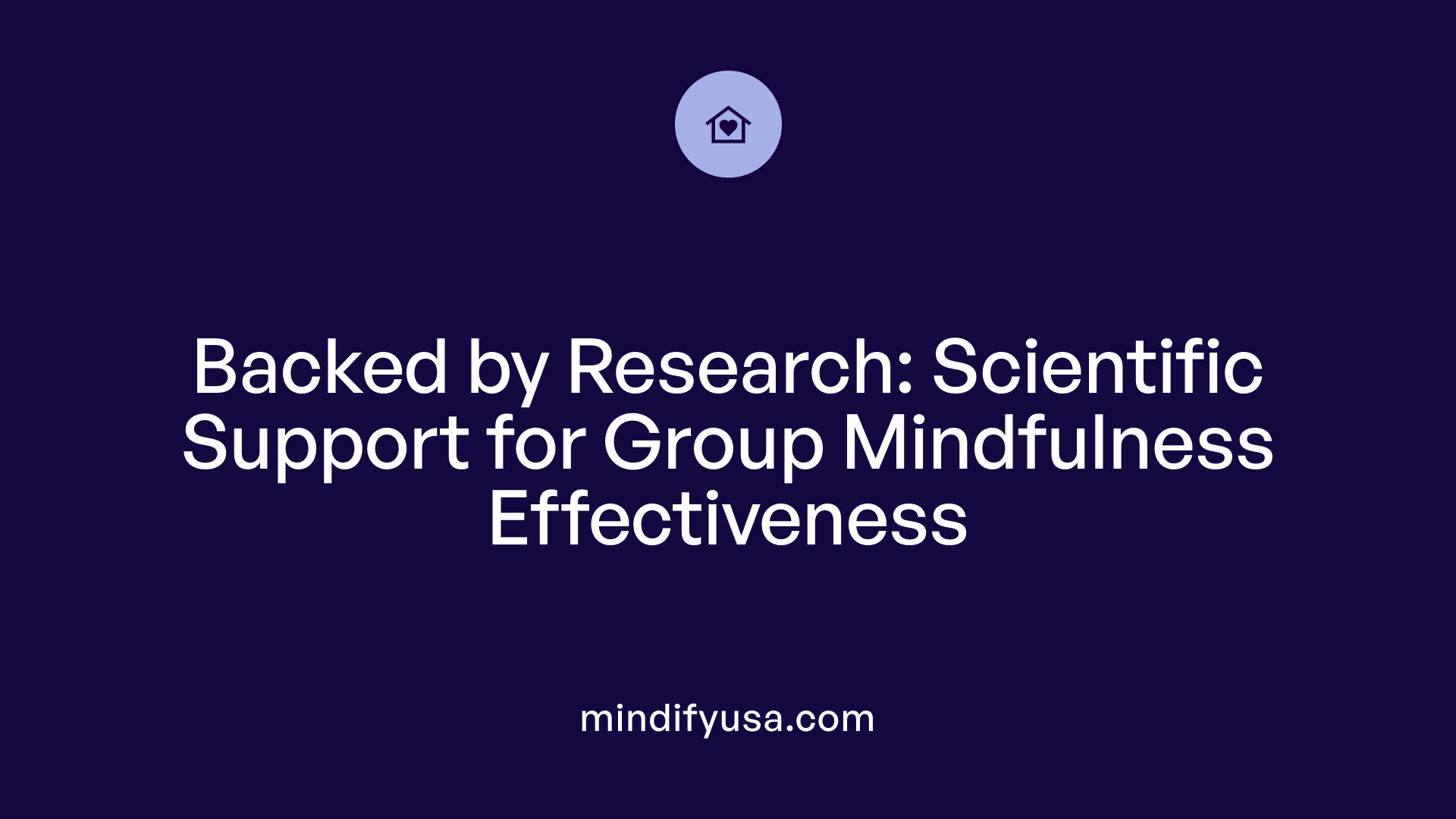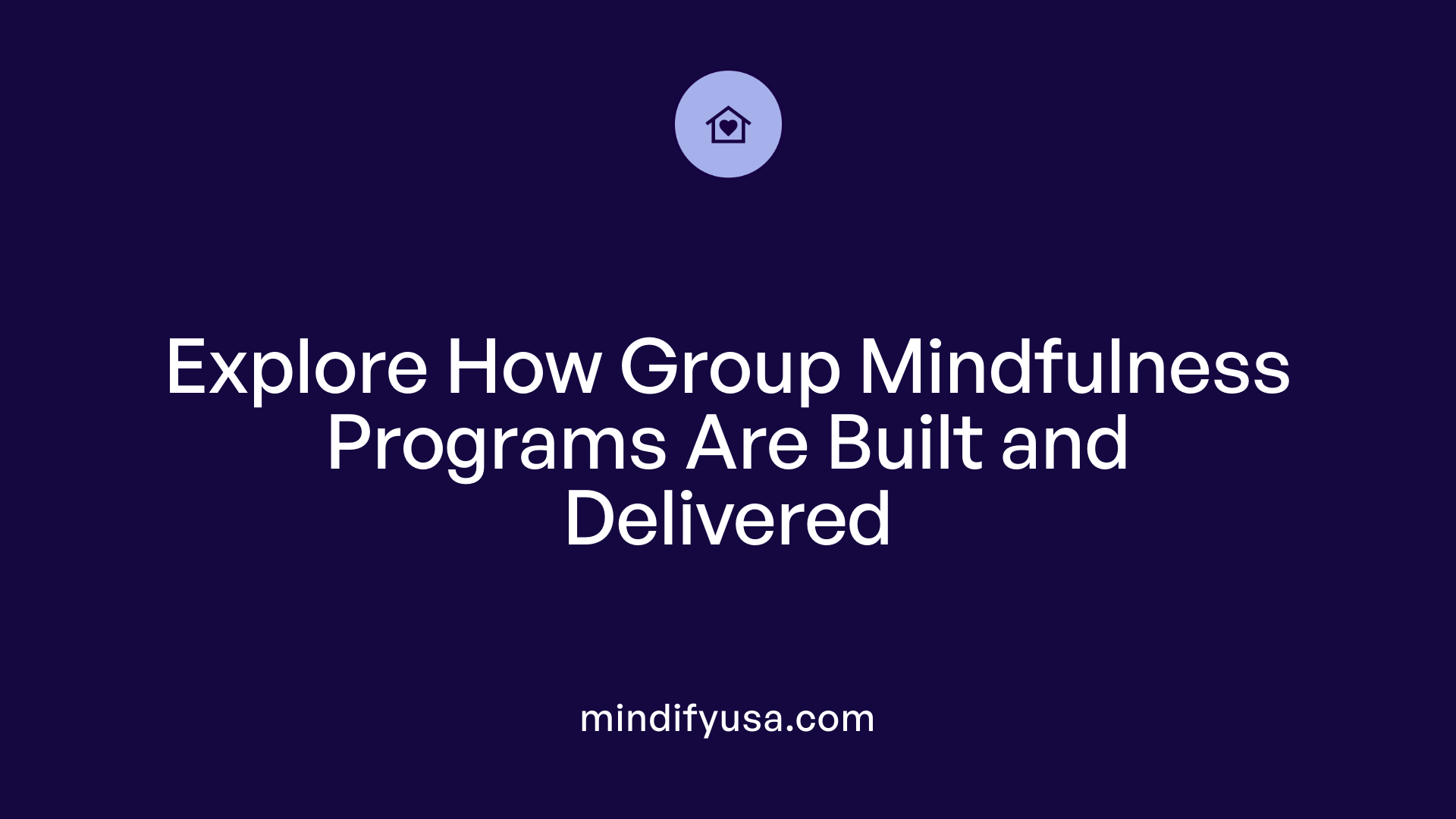Understanding the Power of Group-Based Mindfulness Interventions
In recent years, group mindfulness therapy has emerged as a highly effective approach to reducing stress and enhancing emotional well-being among adults. Rooted in principles of present-moment awareness, acceptance, and non-judgment, these interventions leverage collective practice to foster deeper connections and facilitate emotional regulation. This article explores the core techniques, scientific evidence, program structures, and health benefits of group mindfulness therapy, emphasizing how community settings amplify individual stress relief.
Core Principles and Techniques of Group Mindfulness Therapy

What are the principles and techniques of group mindfulness therapy for stress reduction in adults?
Group mindfulness therapy emphasizes cultivating present-moment awareness, non-judgmental acceptance, and emotional regulation. These principles are rooted in evidence-based programs such as Mindfulness-Based Stress Reduction (MBSR) and Mindfulness-Based Cognitive Therapy (MBCT). The main goal is to help individuals develop a compassionate and open attitude towards their thoughts, feelings, and bodily sensations.
Core principles include training attention to the present moment, accepting experiences without resistance, and fostering a balanced perspective on internal and external stimuli. These methods aim to increase psychological resilience and reduce reactivity to stressors.
Practitioners use a variety of techniques, starting with structured exercises like meditation, guided imagery, and body scans. Meditation practices often involve focusing on the breath, bodily sensations, or sounds to anchor attention. Body scans promote awareness of physical sensations throughout the body, helping individuals connect with their physical presence.
Mindful movement and yoga are included to integrate awareness into physical activity, encouraging gentle movement and breath coordination. Walking meditation further emphasizes mindfulness during everyday activities.
Other techniques such as mindful eating and sitting meditation deepen the practice of attention and acceptance, while movement exercises enhance embodiment and calmness. In group settings, guided meditations are typically led by trained facilitators, supporting participants in engaging fully with each practice.
Discussion and experiential exercises form part of each session, allowing individuals to reflect on their experiences and share insights. These discussions foster a sense of community, relatedness, and shared learning, which can enhance motivation and adherence.
Research indicates that such practices effectively reduce anxiety, depression, and stress symptoms by increasing emotional regulation, decreasing rumination, and promoting cognitive flexibility. The group format makes these benefits accessible to more people, offering social support that amplifies individual efforts.
The combination of principles like acceptance, patience, and beginner’s mind encourages participants to treat their experience with kindness and curiosity, fostering a non-judgmental attitude. This approach aligns with neurobiological findings that mindfulness reduces activity in stress-related brain regions such as the amygdala.
In sum, group mindfulness therapy integrates a variety of practices designed to cultivate present-moment awareness, foster acceptance of internal experiences, and promote emotional well-being. These techniques are delivered in a supportive environment that emphasizes experiential learning, community, and consistent practice, leading to improved stress management and overall mental health.
Benefits of Group Mindfulness for Stress and Anxiety Relief

What are the benefits of group mindfulness therapy for adult stress and anxiety?
Group mindfulness therapy offers a range of advantages for adults dealing with stress and anxiety. At its core, it encourages individuals to adopt a nonjudgmental awareness of the present moment. This focus helps reduce emotional dysregulation by fostering a calm, accepting attitude toward thoughts and feelings.
Participating in guided meditations and engaging in mindful discussions within a group creates a supportive environment. This setting not only enhances emotional regulation but also strengthens interpersonal skills and boosts overall well-being. The collective aspect of group practice fosters a sense of belonging and connection, which can significantly contribute to resilience against stress.
Research indicates that mindfulness-based interventions (MBIs), especially when practiced in groups, are highly effective in reducing symptoms of anxiety and depression. These interventions often perform on par with, or sometimes better than, cognitive-behavioral therapy (CBT). They help modify cognitive biases and improve affective regulation, leading to more adaptive responses to stressors.
Furthermore, group mindfulness sessions promote social support networks, increasing feelings of connection among participants. This sense of community plays a crucial role in alleviating feelings of isolation often associated with anxiety.
Techniques such as breathe awareness, body scans, and mindful movement are particularly useful in group settings. They improve focus, emotional resilience, and the ability to manage internal reactions more effectively.
Ultimately, regular participation in group mindfulness activities can cultivate a collective resilience, making individuals more capable of handling life's stresses with calmness and clarity.
Scientific Evidence Supporting Efficacy

What evidence exists to support the effectiveness of group mindfulness therapy for stress and anxiety in adults?
Research over the past decade provides strong support for the use of group mindfulness therapy in reducing stress and anxiety among adults. Central to this evidence are randomized controlled trials (RCTs), which are considered the gold standard for evaluating treatment efficacy. Numerous RCTs have demonstrated that mindfulness-based interventions (MBIs), especially Mindfulness-Based Stress Reduction (MBSR), significantly decrease anxiety symptoms across different populations.
In addition to RCTs, meta-analyses, which synthesize results from multiple studies, further confirm that MBIs produce moderate to large improvements in anxiety and overall psychological well-being. These comprehensive reviews highlight that participants often experience reduced stress levels, greater emotional regulation, and enhanced mindfulness skills after completing group programs.
Studies also reveal that the benefits of MBIs extend beyond immediate symptom reduction. Many participants report sustained improvements during follow-up periods, indicating lasting effects. For example, healthcare workers, students, and individuals with chronic conditions like asthma show notable decreases in anxiety when engaging in regular group mindfulness sessions.
The mechanisms behind these improvements include increased decentering—the ability to observe thoughts and feelings objectively—and enhanced self-compassion. These processes foster a greater sense of control over emotional responses, helping individuals better manage stress.
Though some studies mention methodological challenges like small sample sizes or lack of active control groups, the overall evidence still strongly supports group mindfulness therapy as an effective and safe approach to managing adult stress and anxiety.
| Evidence Type | Summary of Findings | Population Examples |
|---|---|---|
| Randomized Controlled Trials (RCTs) | Show significant reductions in anxiety, improved emotional regulation | Healthcare professionals, students, general adult populations |
| Meta-Analyses | Confirm moderate to large effect sizes across multiple studies | Diverse demographic groups |
| Long-term Follow-ups | Demonstrate sustained mental health benefits | Patients with recurrent depression, chronic illness sufferers |
These robust scientific findings endorse the inclusion of group mindfulness programs like MBSR and MBCT in therapeutic settings to improve mental health outcomes for adults dealing with stress and anxiety.
Program Structure and Implementation

How are group mindfulness therapy programs typically structured and implemented?
Group mindfulness therapy programs are generally organized as a series of sessions that span several weeks, commonly lasting around 8 to 16 weeks. Each session is carefully designed to introduce and deepen mindfulness practices such as guided meditations, body scans, breathing exercises, and gentle movements like mindful walking or yoga.
During these sessions, participants often engage in discourse about the principles of mindfulness, emotional regulation, and stress management techniques. These discussions foster shared understanding, emotional support, and collective learning, which enhances the overall experience.
The core of the program involves practical exercises, which are complemented by psychoeducational components that explain how mindfulness influences mental and physical health. These components may cover topics like managing anxiety, reducing stress, improving focus, and understanding the nature of thoughts and emotions.
Implementation of these programs benefits greatly from trained facilitators who possess certification or extensive experience in mindfulness-based approaches like MBSR or MBCT. Facilitators guide practices, encourage group discussions, and ensure a safe, inclusive environment.
Successful programs also require organizational planning, including securing appropriate venues—whether in-person spaces or virtual platforms—and providing resources such as audio-guided meditations or instructional materials. Strategic leadership is important to recruit participants, sustain engagement, and evaluate outcomes.
Addressing organizational and cultural considerations is vital. Tailoring programs to fit diverse populations involves incorporating trauma-informed approaches, cultural sensitivities, and accommodating different learning styles. This can include language adjustments, offering flexible session formats, and ensuring accessibility.
Technological barriers, such as limited internet access, can be mitigated through hybrid models combining online and face-to-face sessions. Equally important is ongoing support post-program, which might involve follow-up sessions, booster courses, or access to community groups.
In summary, effective group mindfulness programs are structured around consistent, progressive practices, backed by trained facilitators, with thoughtful adaptations to organizational context and participant diversity. This balance facilitates skill development, emotional resilience, and more profound internal awareness, ultimately leading to improved well-being and psychological functioning.
Health Benefits of Mindfulness Exercises

What are the health benefits of practicing mindfulness exercises for stress reduction in adults?
Practicing mindfulness exercises provides a wide range of health advantages, especially concerning stress relief. When adults incorporate mindfulness into their routines, they often experience reduced levels of stress and anxiety. This is because mindfulness emphasizes being fully present and aware of one’s current experiences without judgment, which can diminish rumination and emotional reactivity.
Scientific studies have demonstrated that mindfulness practice can lower blood pressure and improve sleep quality, both vital for maintaining good physical health. Moreover, mindfulness helps alleviate physical pain, offering a holistic approach to health management.
Beyond physical benefits, mindfulness significantly boosts mental health. It has been shown to decrease symptoms associated with depression and anxiety, helping individuals manage their emotions better. Techniques like meditation, mindful walking, and eating facilitate enhanced emotional regulation and cognitive flexibility.
Regular engagement in mindfulness activities fosters resilience to daily stressors and promotes general well-being. These exercises include guided meditations, breathing practices, and mindful movement, all of which contribute to improved mental clarity and emotional balance.
Overall, incorporating mindfulness exercises into daily routines can lead to improved physical health outcomes and a healthier mental outlook, making it a valuable tool for enhancing quality of life in adults.
Integrating Mindfulness into Daily Life and Broader Contexts
Routine practices to foster mindfulness
Practicing mindfulness regularly in daily life can significantly improve overall well-being and emotional resilience. Common routines include mindful breathing, body scans, and conscious observation of one's surroundings. These exercises can be easily integrated into daily activities such as commuting, meal times, or short breaks at work. By dedicating just a few minutes each day to mindful attention, individuals can develop a more present-focused mindset that reduces stress and enhances clarity.
Adapting online and retreat formats
Mindfulness programs are highly adaptable and can be accessed in various formats, making it easier for people to incorporate these practices regardless of their schedule or location. Online courses, like the extensive self-paced programs inspired by the original MBSR and MBCT models, have helped over 8,000 participants worldwide. These digital formats include guided meditations, instructional videos, and interactive modules that teach core mindfulness techniques.
Retreats, on the other hand, offer immersive environments where participants can deepen their practice through intensive group meditation, silent periods, and guided discussions. Whether online or in retreat settings, the structure often includes expert guidance and peer support, which can motivate continuous engagement and foster community.
Including exercises like forgiveness and vulnerability in group settings
Expanding the scope of mindfulness activities to include exercises such as forgiveness, vulnerability, and acceptance can offer profound emotional benefits. When practiced collectively, these exercises facilitate a safe environment for sharing and emotional expression, which can be particularly healing.
Group activities like mindful goal setting, anchor breathing, collective silent connection, and mindful movement are proven to be effective in community settings. These activities encourage participants to engage with their emotions openly, promoting empathy and strengthening interpersonal bonds.
Incorporating forgiveness exercises, for instance, helps reduce resentment and cultivate compassion, boosting emotional health. Vulnerability practices foster trust and authenticity, reinforcing personal and collective growth. When performed regularly in groups, such exercises can support lasting change, building resilient communities centered around mindfulness and mutual understanding.
Practical table of mindfulness activities
| Activity | Description | Benefits | Suitable Setting |
|---|---|---|---|
| Guided Meditations | Listen to audio recordings guiding attention | Reduce stress, increase focus | Daily, group, online |
| Body Scan Meditation | Focus on bodily sensations systematically | Improve relaxation, body awareness | Home, group retreats |
| Mindful Movement | Gentle stretching, yoga, walking with awareness | Enhance physical and emotional balance | Classes, retreats |
| Forgiveness Exercises | Practice releasing resentment | Emotional healing, peace | Group therapy, workshops |
| Vulnerability Sharing | Share personal experiences in a safe environment | Foster trust, deepen connections | Support groups, retreats |
| Group Goal Setting | Collaborative setting of mindful intentions | Enhance motivation, cohesion | Team or community groups |
| Anchor Breathing | Focus on breath as an anchor to present moments | Calm nerves, improve emotional regulation | Any setting, daily practice |
Embracing mindfulness for holistic health
In summary, integrating mindfulness into everyday routines and broader social contexts involves a flexible approach that includes structured practices, online and retreat formats, and emotionally expressive exercises. These methods support not only individual mental health but also promote community resilience. As more research highlights the mental and physical health benefits—such as reduced anxiety, depression, and stress, along with improved immune function—mindfulness continues to become a vital part of holistic health strategies.
By adopting these diverse practices, individuals and groups can build a sustainable culture of mindfulness, fostering lasting change through shared understanding, acceptance, and compassion.
Innovative and Accessible Approaches to Mindfulness
How are online courses and mobile apps transforming group mindfulness practices?
In recent years, technology has significantly expanded access to mindfulness activities. Online courses and mobile apps now allow people from around the world to participate in guided meditations, mindfulness exercises, and group therapy sessions anytime and anywhere. These digital tools emulate the supportive environment of in-person groups through interactive features, virtual meetings, and customized programs.
For example, the popular mindfulness course developed by Jon Kabat-Zinn’s approach offers over 8,000 graduates from 120 countries a flexible, fully online program. Participants engage with a variety of teaching resources from renowned mindfulness teachers such as Tara Brach, Sharon Salzberg, and Thich Nhat Hanh. These accessible formats help individuals integrate mindfulness into their daily routines without geographical or time constraints.
What are the benefits of self-paced mindfulness programs?
Self-paced programs are gaining popularity because they cater to individual schedules and learning paces. Unlike traditional eight-week group courses, these programs allow participants to progress through materials at their own speed, making them ideal for busy adults or those with unpredictable schedules.
Courses include a rich mix of videos, guided meditations, reflective exercises, and homework assignments. Many are free or low-cost, lowering barriers to entry and encouraging ongoing practice. This flexibility encourages consistency and long-term integration of mindfulness practices, which enhances their overall effectiveness.
How are trauma-sensitive adaptations making group mindfulness inclusive?
Trauma-sensitive mindfulness programs focus on creating safe, welcoming environments for individuals with histories of trauma or complex emotional challenges. These adaptations include careful language, pacing, and offering options that prioritize physical and emotional safety.
For example, the 'Relaxation Enhancement Group Therapist Manual' discusses stress management techniques tailored for people with trauma-related disorders. These modifications help participants gradually build a sense of safety and trust, enabling them to benefit from mindfulness without risking retraumatization.
What is the significance of the global reach with diverse teachers?
The global dissemination of mindfulness education features diverse teachers from different cultural and philosophical backgrounds. This diversity enriches the learning experience, making practices more accessible and relatable for participants worldwide.
Courses often incorporate teachings from a wide array of renowned mindfulness and meditation experts, including Thich Nhat Hanh, Pema Chodron, and Kristin Neff. This variety not only broadens perspectives but also fosters a sense of global community, essential for collective healing and well-being.
| Delivery Method | Description | Benefits |
|---|---|---|
| Online courses | Self-paced, accessible via internet, including videos, meditations, and discussion forums | Flexible, wide reach, customizable, cost-effective |
| Mobile apps | On-the-go guided meditations, reminders, and tracking tools | Portable, daily practice support, user-friendly |
| Live virtual group sessions | Real-time interactions with instructors and peers | Interactive, immediate feedback, social connection |
| Trauma-sensitive programs | Modifications designed for safety and inclusivity | Accessible for trauma survivors, reduces re-traumatization |
These advancements in how group mindfulness practices are delivered help expand their reach, making them more inclusive, adaptable, and effective for diverse populations worldwide.
Transforming Stress into Strength with Community Support
In summary, group mindfulness therapy presents a powerful, scientifically supported method to combat stress and anxiety among adults. By emphasizing shared practice, collective awareness, and acceptance, these interventions harness the social nature of humans to foster resilience and well-being. As research continues to affirm its benefits, and diverse delivery formats expand access, group mindfulness stands as a vital tool for promoting mental health in contemporary society. Embracing these practices can help transform stress into strength, cultivating a more connected, balanced, and resilient community.
References
- Practicing Mindfulness in Groups: 8 Activities and Exercises
- Mindfulness-Based Interventions for Anxiety and Depression
- Mindfulness exercises
- Mindfulness meditation: A research-proven way to reduce ...
- Mindfulness-Based Stress Reduction: The Ultimate MBSR ...
- Mindfulness-based stress reduction services
- Stress Less: Relaxation Enhancement Group Therapist ...
- How to Manage Stress with Mindfulness and Meditation
- Online MBSR/Mindfulness (Free)
- Mindfulness-Based Interventions for Anxiety and Depression





































































































